Explanation of my 10 Ballon d'Or 1972
This is my ranking, my opinion on the Ballon d'Or of the year 1973. This ranking is based on the calendar year, not the season. What counts for this ranking is the player's regularity over the calendar year, the number of matches played, the ability to raise his level in big games, statistics (goals, assists, clean sheets, goals conceded, etc.) and trophies won (collective and individual).
#10 Jairzinho
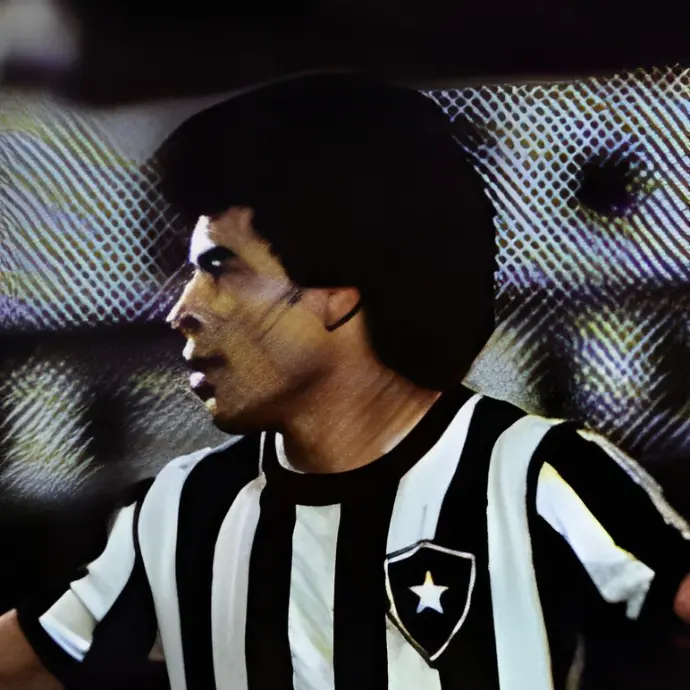
- Age : 27 years old
- Club : Botafogo
- Statistics : 39 games, 21 goals, / assists
- Trophies : Independance Cup, Brazilian League Vice-Champion
- Individual Awards : South American TOTY
In 1972, Jairzinho was the aftershock of a golden era—raw, relentless, and still reverberating with the echoes of Mexico '70. At 27, he wasn’t just a winger—he was a whirlwind in boots, a force of nature who had already conquered the world and wasn’t done yet. That year, he didn’t need to prove himself. He needed only to remind everyone that the storm hadn’t passed—it had simply changed direction. For Botafogo, he was the soul and the spectacle. The club finished as vice-champions of Brazil, and Jairzinho was their lightning rod—cutting in from the right, leaving defenders in his wake, and striking with the fury of a man who knew exactly what he was. His goals weren’t just finishes—they were declarations of intent. His dribbles weren’t just evasions—they were acts of defiance. He didn’t glide. He surged. He didn’t play the game. He tore through it. In the Seleção, he had stepped out of Pelé’s shadow and into his own legend. With the King retired, Jairzinho became the face of Brazil’s new chapter. And in 1972, he led them to the Copa Independência title—a tournament created to celebrate Brazil’s 150 years of independence. He scored three goals in five matches, including a thunderous strike in the final against Portugal. It wasn’t just a win. It was a coronation. That year, he was named the third-best player in South America. But Jairzinho was never about rankings. He was about moments. The kind that left crowds breathless and defenders broken. He was a winger with a striker’s hunger, a showman with a warrior’s edge. He didn’t ask for space—he took it. He didn’t wait for greatness—he chased it down and made it his.
#9 Johan Neeskens
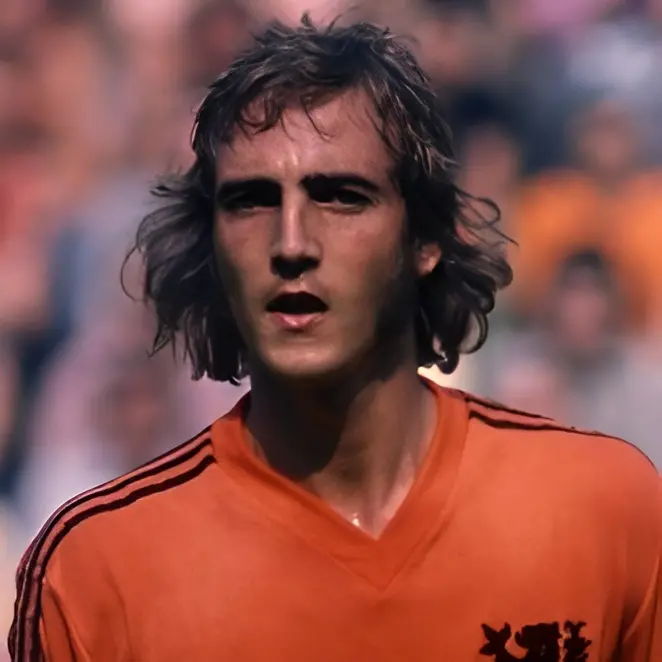
- Age : 20/21 years old
- Club : Ajax Amsterdam
- Statistics : 46 games, 17 goals, 9 assists
- Trophies : Champions League, Intercontinental Cup, UEFA Supercup, Eredivisie, Dutch Cup
- Individual Awards : Champions League TOTY, Eredivisie TOTY
In 1972, Johan Neeskens was the engine beneath Ajax’s elegance—a relentless, intelligent force who gave Total Football its teeth. At just 21, he played with the maturity of a veteran and the hunger of a man determined to leave his mark on every blade of grass. That year, he was everywhere—pressing, passing, tackling, scoring—his influence radiating from midfield like a pulse. For Ajax, he was indispensable, playing 41 matches across all competitions and helping the club to a second consecutive European Cup, a domestic league title, and the KNVB Cup. He wasn’t the artist like Cruyff, but he was the architect’s right hand—the one who made the vision work. He scored seven goals in the Eredivisie, added two assists in Europe, and played every minute of Ajax’s European campaign, including the 2–0 dismantling of Inter Milan in the final. For the Netherlands, he was becoming the heartbeat of a team on the rise, anchoring the midfield in World Cup qualifiers and friendlies with the same blend of grit and grace. Neeskens didn’t play for applause—he played for control. He could break up play with a crunching tackle, then launch an attack with a perfectly weighted pass. In 1972, Johan Neeskens wasn’t yet the global star he would become, but he was the foundation of a revolution.
#8 Kazimierz Deyna
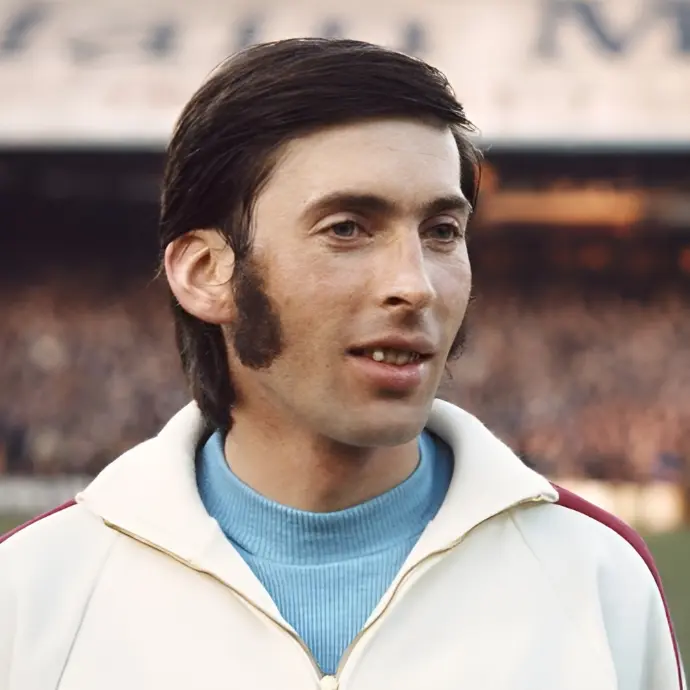
- Age : 24/25 years old
- Club : Legia Varsovia
- Statistics : / games ; / goals ; / assists
- Trophies : Olympic Games
- Individual Awards : Polish POTY, Olympic Games POTT, Olympic Games TOTT, Olympic Games Golden Shoe (9 goals)
In 1972, Kazimierz Deyna was the architect of a footballing renaissance—elegant, cerebral, and devastating in his own quiet way. At 25, he was no longer just Poland’s promise—he was its pulse, orchestrating every movement with a general’s poise and a poet’s touch. That year, he led Legia Warsaw with the authority of a man who had already conquered the domestic game, but it was on the international stage that he truly ascended. At the Munich Olympics, Deyna didn’t just shine—he blazed, finishing as the tournament’s top scorer with nine goals and guiding Poland to a historic gold medal. He wasn’t the loudest player on the pitch, but he was always the most essential—head up, eyes scanning, dictating tempo with a flick, a feint, a pass that split defenses like scripture. His left foot was a scalpel, his vision panoramic, and his signature curling strikes earned him the nickname “Rogal”—the croissant. In a year dominated by the likes of Beckenbauer and Cruyff, Deyna carved out his own space in the conversation, finishing among the top contenders for the Ballon d’Or and reminding Europe that genius could wear red and white. He wasn’t just a playmaker—he was a conductor, a strategist, a symbol.
#7 Teófilo Cubillas
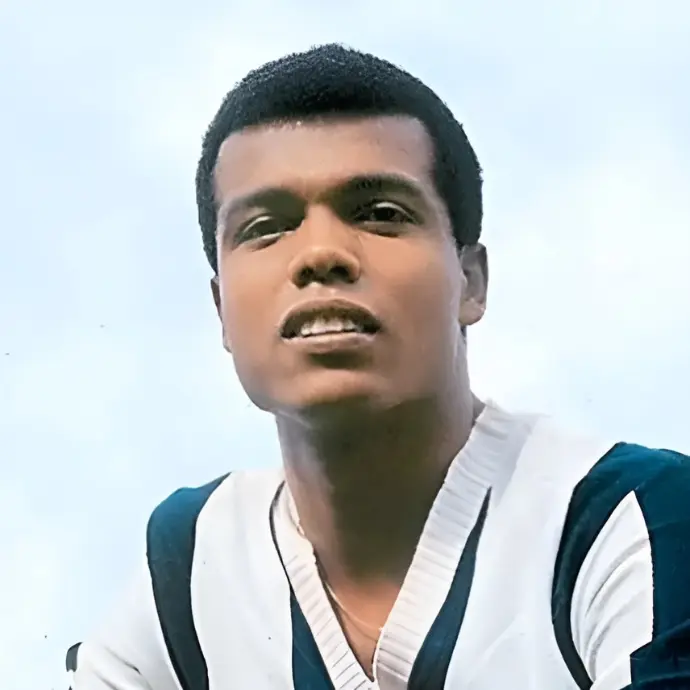
- Age : 22/23 years old
- Club : Alianza Lima
- Statistics : 37 games, 20 goals, / assists
- Trophies : Peruvian League Vice-Champion
- Individual Awards : South American POTY, South American TOTY, Copa Libertadores TOTY, Copa Libertadores Golden Shoe (6 goals)
In 1972, Teófilo Cubillas was South America’s best-kept secret no longer—he was brilliance made flesh, a number 10 who played like he was writing symphonies with his boots. At 23, “El Nene” was already a national treasure in Peru, but that year he became a continental force. For Alianza Lima, he was unstoppable—nimble, visionary, and lethal in front of goal, finishing as the top scorer of the Copa Libertadores with six goals. But it was his orchestration, not just his finishing, that set him apart. He didn’t just play between the lines—he bent them. Every touch was a whisper of genius, every pass a thread pulled from the fabric of the game. He was named South American Footballer of the Year in 1972, finishing ahead of none other than Pelé, who had once called him his successor. And it wasn’t hyperbole. Cubillas had the balance of a dancer, the precision of a surgeon, and the calm of a man who knew the game would always move to his rhythm. Though Peru didn’t qualify for the 1974 World Cup, Cubillas’s star only rose, his performances a reminder that greatness doesn’t always need a global stage to be undeniable.
#6 Piet Keizer
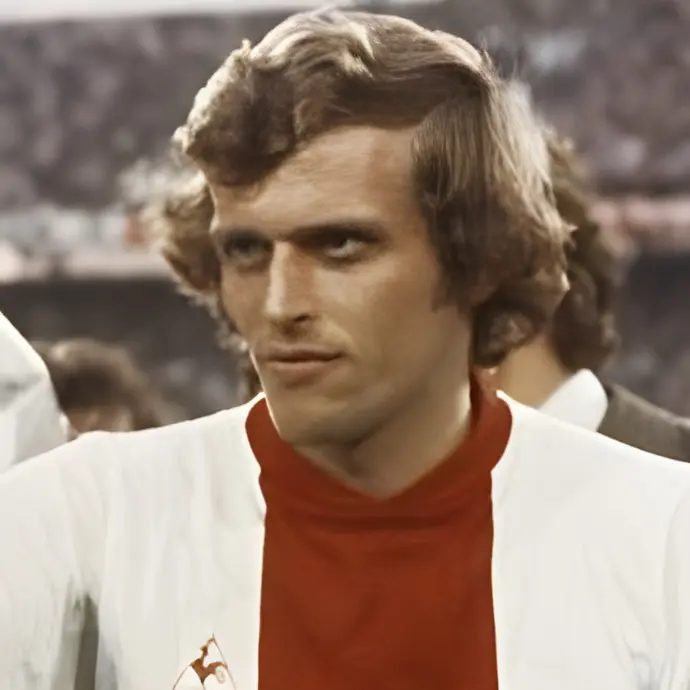
- Age : 28/29 years old
- Club : Ajax Amsterdam
- Statistics : 44 games, 19 goals, 19 assists
- Trophies : Champions League, Intercontinental Cup, UEFA Supercup, Eredivisie, Dutch Cup
- Individual Awards : Champions League TOTY, Eredivisie TOTY
In 1972, Piet Keizer was the quiet craftsman behind Ajax’s symphony of dominance—measured, mercurial, and maddeningly effective. At 29, he wasn’t the face of Dutch football—that was Cruyff—but he was its soul, the left-footed artisan who painted masterpieces from the wing while others chased headlines. That year, Keizer was at the heart of Ajax’s third consecutive European Cup triumph, slicing through Inter Milan’s defense in the final with the same understated brilliance that had defined his career. He didn’t dazzle with flair—he dismantled with precision. His dribbles were surgical, his crosses venomous, and his goals—like the one against Milan—were reminders that elegance could be lethal. Domestically, he helped Ajax to another Eredivisie title and a KNVB Cup, completing a treble that cemented the club’s place in footballing lore. And yet, Keizer remained the enigma—beloved in Amsterdam, underappreciated elsewhere. His international career, limited to 34 caps, was stifled by a strained relationship with Rinus Michels, and though he was part of the 1974 World Cup squad, he watched the final from the bench. But in 1972, he was untouchable. The captain of the greatest club side in the world, the first full-time professional at Ajax, and the man who made the number 11 shirt a symbol of subtle genius.
#5 Eusébio
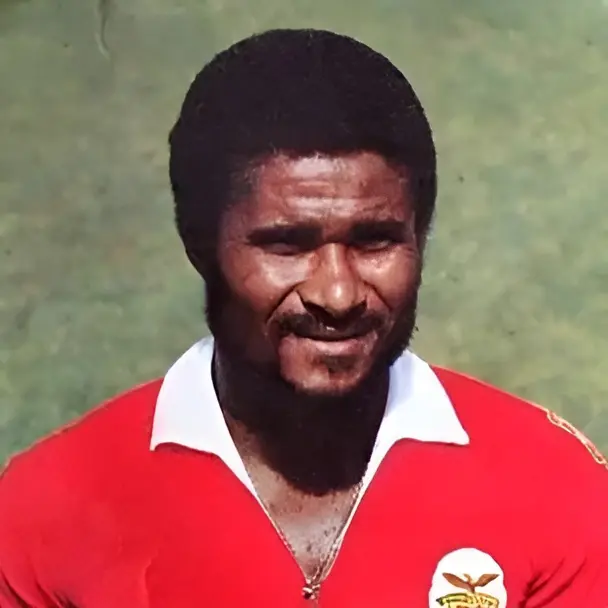
- Age : 30 years old
- Club : Benfica Lisbon
- Statistics : 49 games, 45 goals, / assists
- Trophies : Portuguese League, Portuguese Cup
- Individual Awards : Portuguese League TOTY
In 1972, Eusébio was no longer the future—he was the enduring flame of a golden past, still burning with brilliance, still impossible to ignore. At 30, he wasn’t the same explosive force who had lit up the 1966 World Cup, but he had evolved—less raw pace, more refined menace. That year, he finished ninth in the Ballon d’Or rankings, a testament to his continued excellence in a game that was rapidly changing around him. For Benfica, he remained the talisman, guiding them to yet another Portuguese league title with his trademark blend of power, precision, and poise. His goals still came in torrents—thunderous strikes from distance, deft finishes in the box, headers that defied gravity. But more than that, he was the heartbeat of a team that dominated domestically and threatened in Europe. He didn’t just play the game—he elevated it, with a grace that made the extraordinary seem routine. In an era increasingly defined by systems and structure, Eusébio was the glorious exception—a player who could still bend a match to his will with a single touch.
#4 Günter Netzer
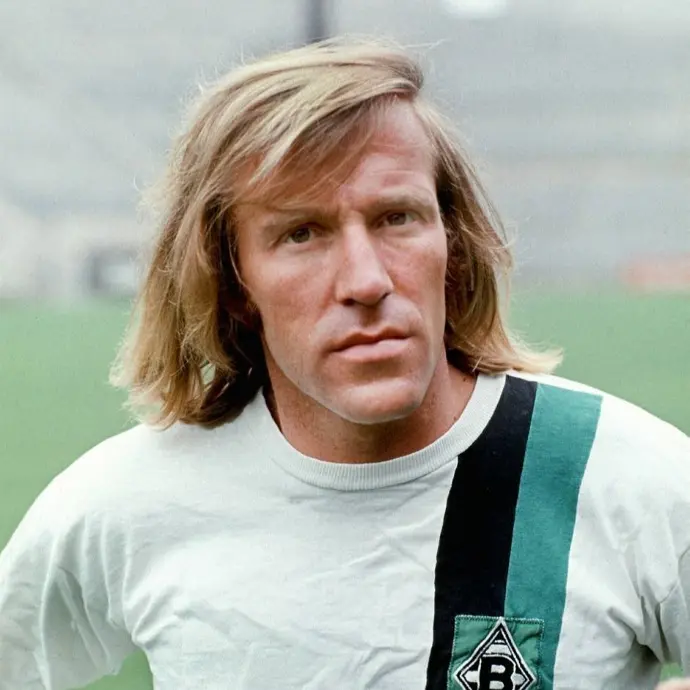
- Age : 27/28 years old
- Club : Borussia M'gladbach
- Statistics : 41 games, 15 goals, / assists
- Trophies : Euro
- Individual Awards : Euro TOTT, Bundesliga POTY, Bundesliga TOTY
In 1972, Günter Netzer was West Germany’s beautiful contradiction—rebellious yet refined, chaotic yet calculated, a playmaker who didn’t just dictate tempo but rewrote the rhythm entirely. At 28, he was the beating heart of a Borussia Mönchengladbach side that played with swagger and steel, and he was the soul of a national team on the cusp of greatness. That year, Netzer finished second in the Ballon d’Or voting, behind only Franz Beckenbauer, a nod to the way he had transformed midfield play into something operatic. He didn’t just pass—he pierced. Long balls that curved like brushstrokes, surging runs that split defenses, and a right foot that could detonate from distance or caress a set piece into the top corner. He was football’s rock star in an era of regimentation, his flowing blond hair and untucked shirt a visual rebellion against the rigid systems he dismantled with flair. For Mönchengladbach, he was both conductor and catalyst, leading them to the Bundesliga title in 1971 and keeping them in the hunt in 1972 with performances that felt more like performances than matches. And for West Germany, he was the wildcard that made the machine purr—his influence growing ahead of the 1972 European Championship, where he would soon shine.
#3 Franz Beckenbauer
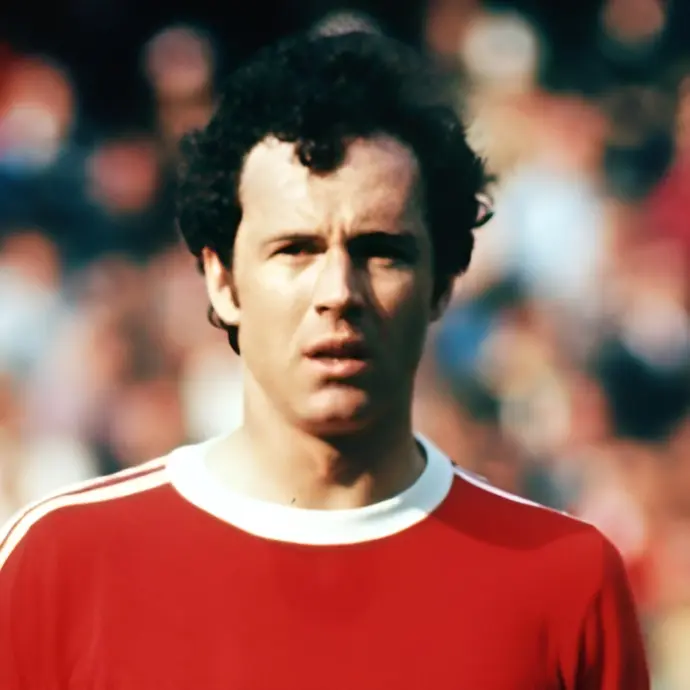
- Age : 27/28 years old
- Club : Bayern Munich
- Statistics : 60 games, 7 goals, 10 assists
- Trophies : Euro, Bundesliga
- Individual Awards : Euro TOTT, Bundesliga TOTY
In 1972, Franz Beckenbauer was football’s philosopher-king—graceful, commanding, and utterly untouchable. At 27, he wasn’t just the best defender in the world—he was redefining what a defender could be. That year, he led West Germany to the European Championship title with a style that was both regal and ruthless, orchestrating play from the back with the vision of a playmaker and the composure of a surgeon. He didn’t just stop attacks—he started them, gliding out of defense with the ball at his feet like a conductor stepping onto the podium. For Bayern Munich, he was the cornerstone of a side that had begun its ascent to continental dominance, and his performances were so complete, so effortless, that they seemed to exist outside of time. Beckenbauer didn’t shout for attention—he drew it with every stride, every pass, every perfectly timed interception. He was the libero, the free man, but he was also the fixed point around which everything else revolved.
#2 Gerd Müller
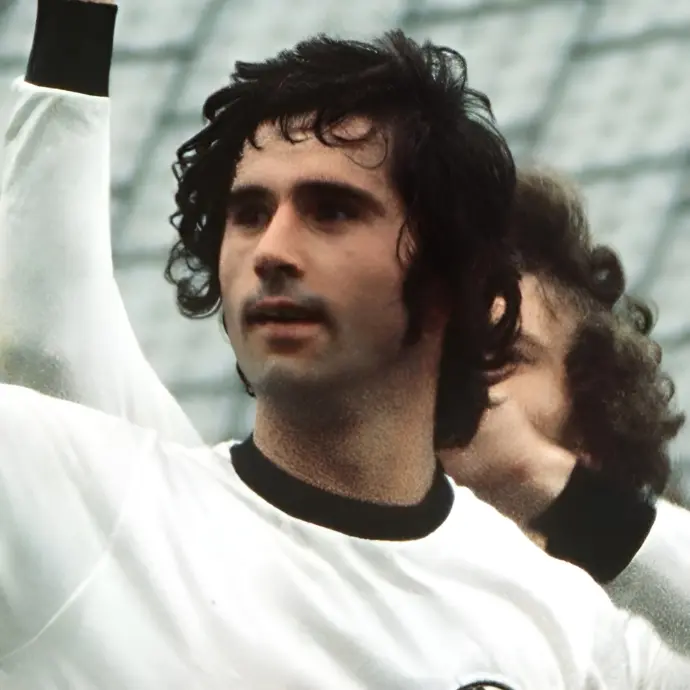
- Age : 16/17 years old
- Club : Bayern Munich
- Statistics : 60 games, 13 goals, 26 assists
- Trophies : Euro, Bundesliga
- Individual Awards : Euro TOTT, Euro Golden Shoe (4 goals), Bundesliga TOTY, Bundesliga Golden Shoe (40 goals)
In 1972, Gerd Müller was inevitability in motion—a striker so relentless, so precise, that defenders didn’t try to stop him so much as survive him. At 26, he was at the absolute peak of his powers, a goal machine whose efficiency bordered on the absurd. That year, Müller scored 40 goals in 34 Bundesliga matches for Bayern Munich, a record that would stand for nearly five decades, and added another 13 in European competition. But it wasn’t just the volume—it was the timing, the instinct, the uncanny ability to be exactly where the ball would fall. For West Germany, he was the hammer behind the elegance, scoring four goals in the 1972 European Championship, including two in the final against the Soviet Union, as the Mannschaft lifted the trophy in dominant fashion. He finished third in the Ballon d’Or voting that year, but no one questioned who the most feared man in the box was. Müller didn’t glide or dazzle—he struck. Low center of gravity, lightning reflexes, and a nose for goal that defied logic. He didn’t need space. He needed half a second. In 1972, Gerd Müller wasn’t just scoring goals—he was setting the standard. He was the final touch on every masterpiece, the exclamation point at the end of every German sentence.
Winner : Johan Cruyff
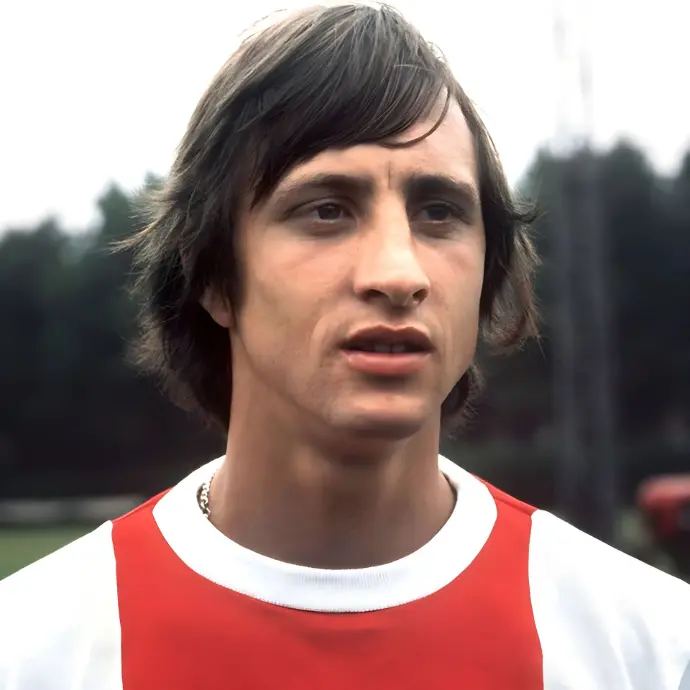
- Age : 24/25 years old
- Club : Ajax Amsterdam
- Statistics : 43 games, 42 goals, 29 assists
- Trophies : Champions League, Intercontinental Cup, UEFA Supercup, Eredivisie, Dutch Cup
- Individual Awards : Champions League POTY, Champions League TOTY, Champions League Golden Shoe (5 goals), Intercontinental Cup POTT, UEFA Supercup POTT, Eredivisie POTY, Eredivisie TOTY, Eredivisie Golden Shoe (25 goals)
In 1972, Johan Cruyff was football’s great disruptor—visionary, volatile, and utterly transcendent. At 25, he wasn’t just the engine of Total Football—he was its architect, its prophet, its living proof. That year, he led Ajax to their second consecutive European Cup, dismantling Inter Milan in the final with a performance that was less about goals and more about geometry—Cruyff didn’t just play the game, he reimagined its dimensions. He moved like smoke, thought three passes ahead, and made the impossible look inevitable. For the Netherlands, he was the spark of a revolution still gathering force, and though they hadn’t yet reached their 1974 peak, Cruyff’s influence was already reshaping the national identity. He finished fourth in the Ballon d’Or voting in 1972, but rankings felt irrelevant when watching him play—he was the kind of talent that made numbers feel small. Whether dropping deep to dictate or ghosting past defenders with that signature feint, Cruyff was everywhere and nowhere, the eye of the storm and the chaos around it.